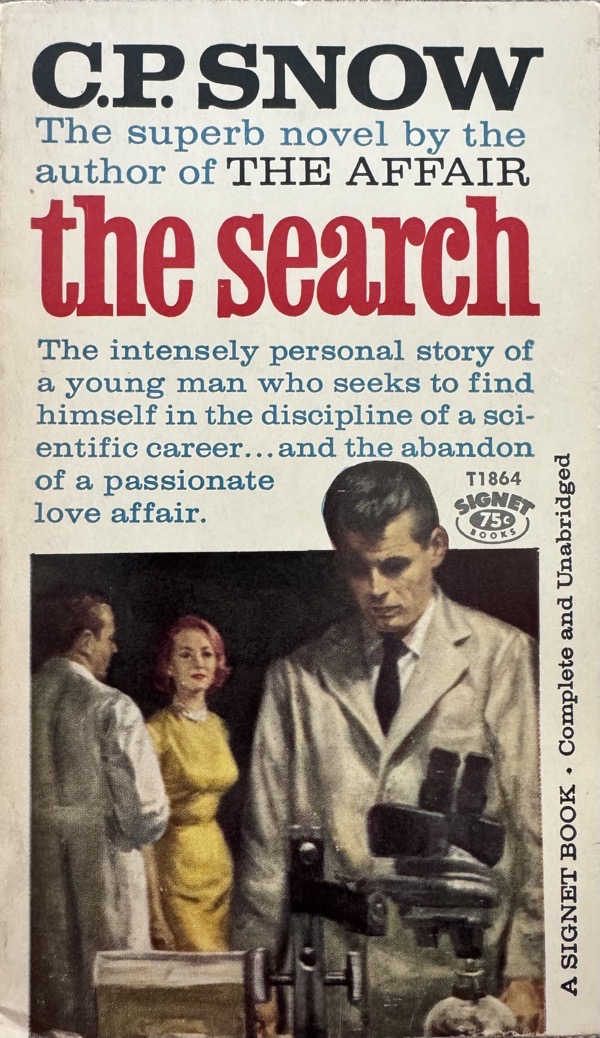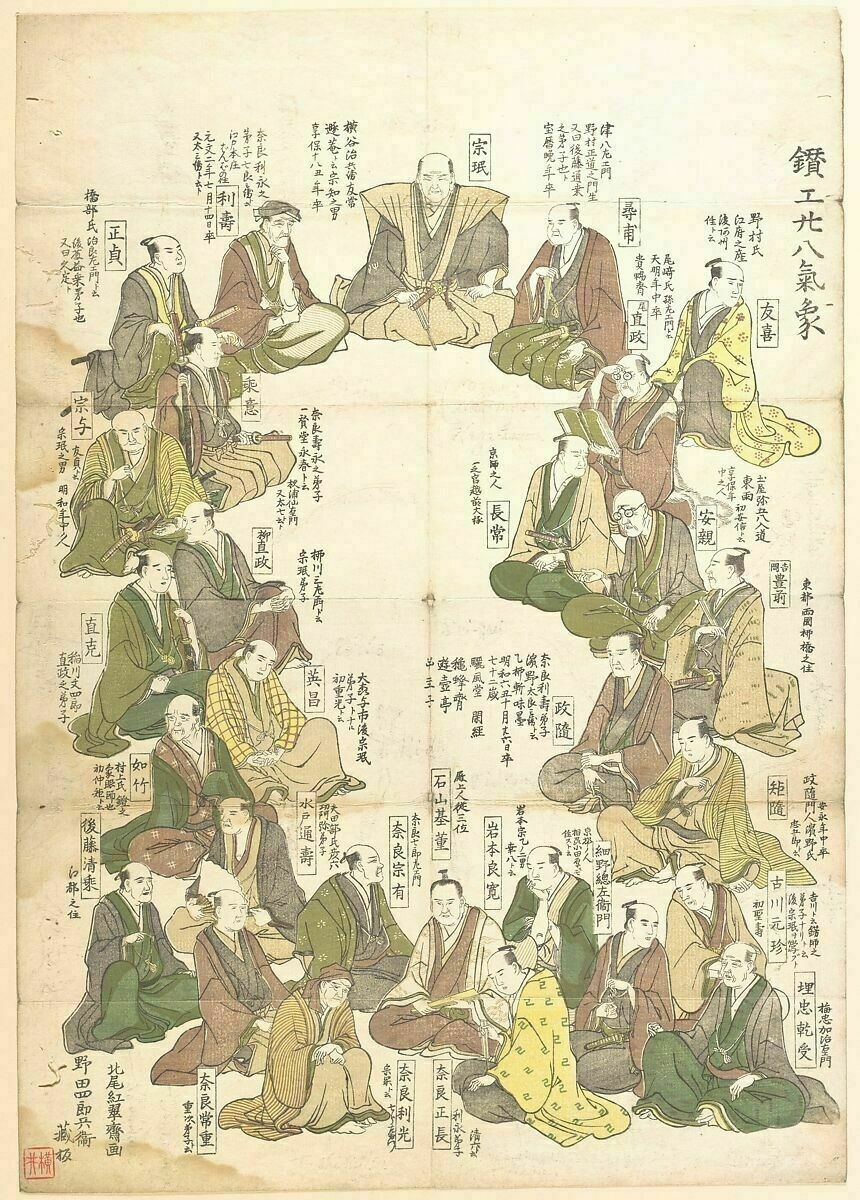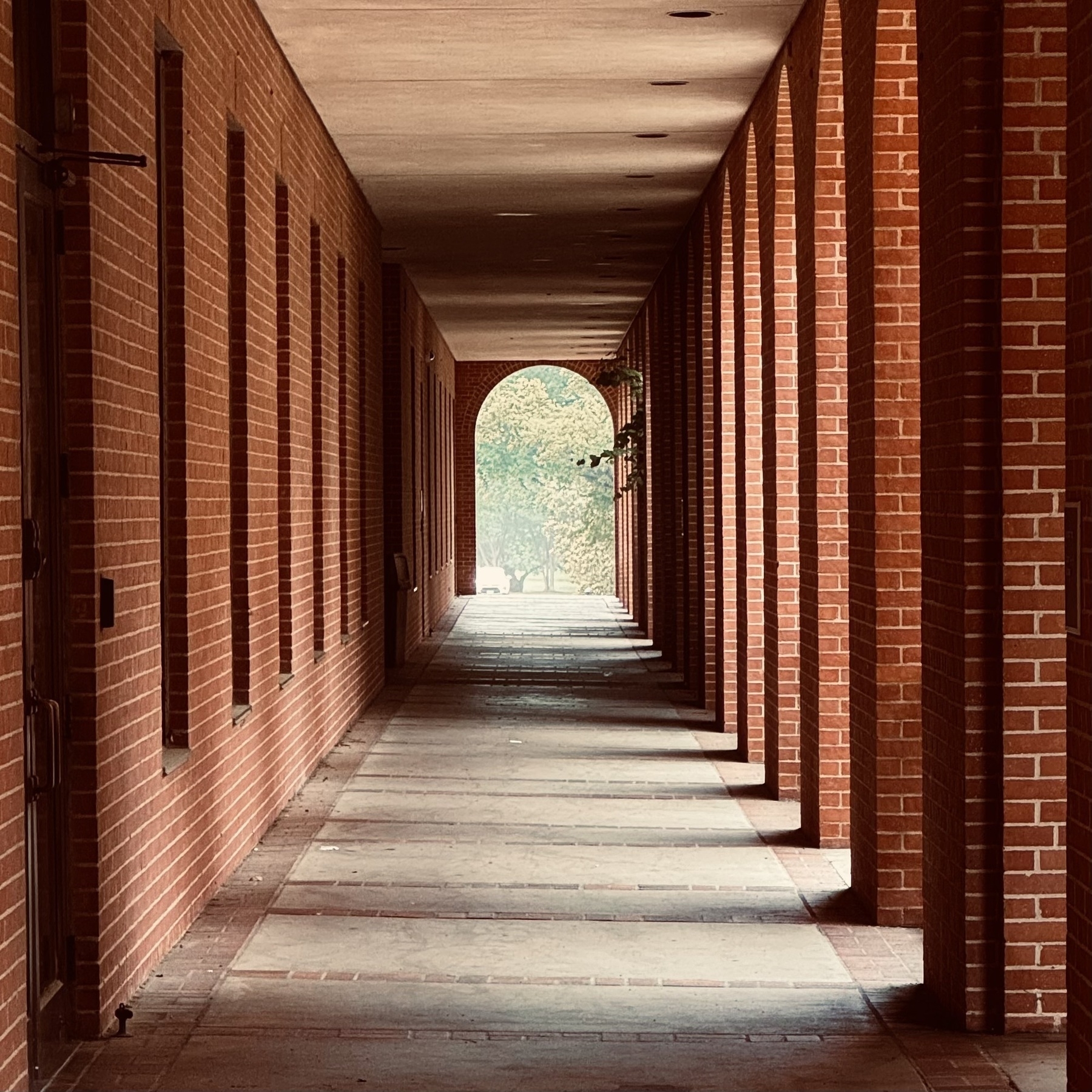On two novels that describe scientific/scholarly integrity – or the lack thereof.
the integrity of science
I haven’t forgotten about middlebrow matters, but right now my mind is on something else. Something related, though.
Readers of Gaudy Night (1935) will recall — stop reading if you haven’t read Gaudy Night and don’t want any spoilers — that the plot hinges on an event that occurred some years before the book’s present-day: a (male) historian fudged some evidence and a (female) historian caught him at it and reported the malfeasance, which led to his losing his job. Late in the book, but before the full relevance of this event to the plot has been revealed, there’s a conversation about scholarly integrity, which I will now drop into the middle of:
“So long,” said Wimsey, “as it doesn't falsify the facts. But it might be a different kind of thing. To take a concrete instance — somebody wrote a novel called The Search — “
“C. P. Snow,” said Miss Burrows. “It's funny you should mention that. It was the book that the — ”
“I know,” said Peter. “That's possibly why it was in my mind.”
A person has been vandalizing Shrewsbury College and a copy of that novel, with certain pages torn out, has been found. The novel, by the way, appeared in 1934, around the time that Sayers began writing Gaudy Night. It would be interesting to know whether it was the direct inspiration for her story, or whether she read it after some elements were already in place. I hope to find out more about that.
And by the way, I am going to be spoiling that novel far more thoroughly than I will spoil Gaudy Night — but it’s not one that many people read, these days.

“I never read the book,” said the Warden.
“Oh, I did,” said the Dean. “It's about a man who starts out to be a scientist and gets on very well till, just as he's going to be appointed to an important executive post, he finds he's made a careless error in a scientific paper. He didn't check his assistant's results, or something. Somebody finds out, and he doesn't get the job. So he decides he doesn't really care about science after all.”
“Obviously not,” said Miss Edwards. “He only cared about the post.”
Neither the Dean, who has read the book, nor Miss Edwards, who hasn’t, is quite accurate. The scholar, whose name is Arthur Miles, probably would have gotten the post even without the paper; but it’s perfectly possible that he rushed the paper, failed to be appropriately self-critical, because he knew that the vote for the Director of a new scientific institute would be coming soon. Miles doesn’t know; he can’t be sure; maybe he would’ve made the mistake anyway. But in any case, as soon as he is told that there’s a problem with his paper, he runs the numbers again, sees the error, and immediately admits that he was wrong.
Let me pause for two digressions:
- Sayers specifies what pages were torn from the book — but I don’t have access to the edition that Sayers had read, which I assume was the first hardcover edition, so I don’t know what exactly was excised, but I suspect that it was the part where Miles admits his mistake. (The whole business is a flaw in Sayers’s plot, because it’s impossible to imagine the Responsible Party having read Snow’s book and known which pages to tear out; but DLS clearly was determined to get a discussion of The Search into her own novel, so she found a way.)
- As it happens, this is Snow’s most autobiographical novel: what happened to Miles also happened to him. He began his career as a chemist, and wrote a paper (published in Nature) which was then discovered to contain an embarrassing mistake — upon which he abandoned his work as a scientist and became a novelist and bureaucrat.
Now, back to Gaudy Night:
“The point about it,” said Wimsey, “is what an elderly scientist says to him. He tells him: ‘The only ethical principle which has made science possible is that the truth shall be told all the time. If we do not penalize false statements made in error, we open up the way for false statements by intention. And a false statement of fact, made deliberately, is the most serious crime a scientist can commit.’ Words to that effect. I may not be quoting quite correctly.“
Wimsey’s summary is a good one. This is indeed what the “elderly scientist,” a man named Hulme, says to him. And Miles does not disagree. What’s more on his mind, though, is the picture of his future laid out for him by another senior scientist:
“You’ve got to work absolutely steadily, without another suspicion of a mistake. You’ve got to let yourself be patronised and regretted over. You’ve got to get out of the limelight. Then in three or four years, you’ll be back where you were; though it will be held up against you, one way and another, for longer than that. It will delay your getting into the Royal [Society], of course. That can’t be helped. You’ll have a lean time for a while; but you’re young enough to get over it.”
Faced with this prospect, Miles realizes that he could only manage all this (“Watching the dullards gloat. Working under Tremlin. Having every day a reminder of the old dreams”) if he had a genuine devotion to science. But: “It occurred to me I had no devotion to science.”
N.B.: the point is not that the event has taken away his devotion to science, but rather, “I am not devoted to science, I thought. And I have not been for years, and I have kept it from myself till now.” The revelation of his error leads to a revelation of what had been true about him all along: “There were so many signs going back so far, if I had let myself see, if it had been convenient to see.” Indeed, it now becomes clear to him that his desire to become the director of a scientific institute — an administrative position, not one that would involve him directly in research — precisely because on some unconscious level he didn’t want to be a scientist any more: “I had thrown myself into human beings — to escape the chill when my scientific devotion ended.”
It should be clear, then, that “he decides he doesn’t really care about science after all” is not an adequate explanation of what happens.
But there’s also a twist in the tail of this story, which in Gaudy Night Sayers calls attention to:
“In the same novel,” said the Dean, “somebody deliberately falsifies a result — later on, I mean — in order to get a job. And the man who made the original mistake finds it out. But he says nothing, because the other man is very badly off and has a wife and family to keep.”
”These wives and families!“ said Peter.
”Does the author approve?“ inquired the Warden.
”Well,“ said the Dean, ”the book ends there, so I suppose he does.”
Or does he? And is that an accurate description of the case? Several facts here are relevant:
- The man who has falsified the data, Sheriff, is one of Miles’s oldest friends.
- Miles got Sheriff his current job and has been guiding his research, trying to keep him on the straight and narrow — he’s a feckless fellow, and a habitual liar, but Miles had hoped that he was ready to reform.
- Sheriff had promised Miles, and also his own wife, that he was working on a safe project when he was in fact working on a high-risk, high-reward one — one he thought likely to lead to a prestigious position that, now that the paper has been published, he is indeed about to be offered.
- Miles has a sense of responsibility for Sheriff because he had hoped to hire him for a position at the aforementioned Institute, but gave up on the idea when he realized that his own position was compromised. He thinks perhaps he should have pushed harder for Sheriff anyway.
- Early in his career Miles had had the opportunity to consciously fudge data himself, and seriously considered it — he thought that he might eventually be found out, but only after achieving a brilliant career from which summit he could just say “Whoops, I made a mistake” — but instead abandoned the research project. He thought, though, that in the future he would have compassion for any scientist who succumbed to a similar temptation.
- And most important of all, Sheriff is married to Audrey, Miles’s former lover, for whom, though he himself is now happily married, he cherishes a strong and lasting tendresse — despite the fact that Sheriff basically stole her affections while Miles was abroad.
The Search is not a great novel, but this is perhaps its best element: the faithful portrayal of Miles’s complex and ever-shifting and deeply human responses to Sheriff’s lying. (It reminds me a bit of the greatest scene of this kind I know, the moment in Middlemarch when Lydgate has to decide how to vote for the chaplaincy of a new hospital. I wrote about that thirty years ago [!!] near the end of this essay.)
On the one hand, he knows exactly what Sheriff did and why:
I had no doubts at all. It was a deliberate mistake. He had committed the major scientific crime (I could still hear Hulme’s voice trickling gently, firmly on).
Sheriff had given some false facts, suppressed some true ones. When I realised it, I was not particularly surprised. I could imagine his quick, ingenious, harassed mind thinking it over. For various reasons, he had chosen this problem; it would not take so much work, it would be more exciting, it might secure his niche straight away. … But I must not know, half because he was a little ashamed, half because I might interfere. So [his research assistant] and Audrey must, for safety’s sake, also be deceived.
All this he would do quite cheerfully. The problem began well. … Then he came to that stage where every result seemed to contradict the last, where there was no clear road ahead, where there seemed no road ahead at all. There he must have hesitated. On the one hand he had lost months, there would be no position for years, he would have to come to me and confess; on the other his mind flitted round the chance of a fraud.
There was a risk, but he might secure all the success still. I scarcely think the ethics of scientific deceit troubled him; but the risk must have done. For if he were found out, he was ruined. He might keep on as a minor lecturer, but there would be nothing ahead.
Miles does not excuse Sheriff at any point; he knows that the man’s dishonesty is habitual, perhaps pathological. But he also knows that Sheriff and Audrey have reached a certain accommodation in their marriage, that Audrey understands who her husband is but loves him and needs him anyway. Miles writes a letter that would expose and run Sheriff, and then, realizing that it would also ruin Audrey, …
I shall not send the letter, I was thinking. Let him win his gamble. Let him cheat his way to the respectable success he wants. He will delight in it, and become a figure in the scientific world; and give broadcast talks and views on immortality; all of which he will love. And Audrey will be there, amused but rather proud. Oh, let him have it.
For me, if I do not send the letter, what then? There was only one answer; I was breaking irrevocably from science. This was the end, for me. Ever since I left professionally, I had been keeping a retreat open in my mind; supervising Sheriff had meant to myself that I could go back at any time. If I did not write I should be depriving myself of the loophole. I should have proved, once for all, how little science mattered to me.
There were no ways between. I could have held my hand until he was elected, and then threatened that either he must correct the mistake, or I would; but that was a compromise in action and not in mind. No, he should have his triumph to the full. Audrey should not know, she had seen so many disillusions, I would spare her this.
The human wins out over the scientific. Maybe, Arthur thinks, it always does. But Gaudy Night shows that sometimes the scientific — in the sense of a strict commitment to the sacredness of honest research — can sometimes have its own victories. And Gaudy Night also suggests that the choices might not be as stark as Snow’s story suggests. More on that in another post.
A good introduction to the Mondragón model. We desperately need a version of this somewhere in the USA, just to demonstrate that business-as-usual is not the only way of doing business.
Related: the Uncovering Roman Carlisle site is fascinating.
Apparently the place for relics of Roman Britain is the Carlisle Cricket Club.
P.S.A.
A number of people have asked me for my thoughts about the current university campus protests. I have very few. As the novelist John Barth said when asked why he hadn’t been involved in the anti-war protests of the Sixties, “the fact that the situation is desperate doesn’t make it any more interesting.” People who aren’t interested in learning (or in politics either, in any meaningful way) have thrown a monkey wrench into the works of universities that don’t care about teaching them. Not my bag.
I think this Ross Douthat column is good, though. I’m grateful that Ross writes about things like this so I can write about very different things.
And finally, the Rio Grande as it emerges from the Santa Elena Canyon (whose walls reach 1500 feet in height) at the western end of the park.

The previous photo was of the Chisos Mountains in the center of the park; this one of the Rio Grande at the park’s eastern boundary.

This photo from Big Bend made me think about some of my own photos of the park, for instance this one.

refuge
Liberal societies, I want to suggest, are those that offer refuge from the very people they empower. The reach of this formulation will become evident when we allow ourselves to use “refuge” in both a literal and a metaphorical sense, so that institutions and practices can offer refuge from a powerful person as much as a fortress can. […]
Because liberal societies offer within them different sorts of refuge, they should not produce many refugees fleeing elsewhere. The United States does not generally produce large refugee flows, but those it has at times produced — as when enslaved Americans fled to Canada before the American Civil War — have offered good indices of weaknesses in its liberal credentials. Liberal societies themselves should by their nature appreciate the plight of foreign refugees and err on the side of welcoming them, but the facts do not allow us to say that liberal societies are always more welcoming than nonliberal societies. The crucial indicator of liberalism is whether a society produces refugees. A society becomes more liberal when it reduces the reasons that people have to flee — not by converting all people to one outlook or identity, but by offering them the chance to find refuge internally. Liberal societies aim to generate no exodus.
It is in this sense that many of the recent developments I have regularly decried on this blog — surveillance capitalism, panoptic governance, coercive administrative practices (especially in academia) — are straightforwardly anti-liberal, sometimes consciously, sometimes blindly. I like the framing of refuge. From Florida's “Stop WOKE” law to the anti-bias “teams” and “task forces” that populate American campuses, the common theme is: You have no refuge from us. Resistance is futile.
Garsten’s essay is trying to do a lot of things, and I think he gets tangled up at times, in interesting ways. For instance, on page 143 he moves seamlessly from celebrating the founding of cities to celebrating the spread of markets, in a way that suggests that he thinks that the reason we have cities is to spread markets. There are other views on that point. But the major themes involve certain claims about healthy societies. Such societies
- do not generate many refugees
- are hospitable to refugees from elsewhere
- provide means of exit from their internal systems and structures
- provide means of exit from the society altogether
Thus the conclusion:
Some critics worry that if we are given the choice to flee evils in the many ways a liberalism of refuge protects, our mobility will turn us into “rootless” beings. This concern has been given too much weight since Heidegger and Arendt. We are not trees who flourish when deeply rooted in the soil. We are human beings with legs, meant to explore. What we need to flourish is not roots so much as refuges from which we can venture forth and to which we can retreat. Often, we end up returning to where we started with new insight or appreciation, like Odysseus gratefully coming home. Sometimes we do not, or cannot, return home, and so we begin again and find, in those beginnings, a distinctively liberal adventure — the noble work of building a new society that refugees know so well.
I have reservations. For one thing, whether “building a new society” is “noble work” depends on the kind of society you’re building. (See: the Taliban.) More important: Is “exploring” the main thing that legs are for? Again, it depends on why you’re exploring. If Garsten had said that legs are for exploring to find food for your family and community, and to bring that food back to those who hunger, I’d have been happier. And in general, I think it’s more important for our minds to explore than our legs, even if when doesn’t create new markets.
In general, Garsten’s vision is a libertarian one, whereas I prefer anarchist models. In my view the primarily difference between libertarianism and anarchism is that the former wants to expand the scope of individual freedom while the latter wants to expand the scope of collaboration and cooperation. What if we were to re-frame “refuge” and “exit” in anarchist, or at least communitarian, terms?
An interesting book in this regard is Lewis’s That Hideous Strength, and especially the character of McPhee. McPhee is basically Lewis’s old tutor, William Kirkpatrick, AKA Kirk or the Great Knock, and I have always found it touching that Lewis sought to find some way to offer that dour atheist the blessings of Christian community, but without as it were forcing him into a false conversion.
The community of St. Anne’s — an attempt by Lewis to embody the themes of his great essay “Membership” — is not quite anarchic, and I say that not because it has a Director but rather because no one else but Mr. Fisher-King could be the Director. Still, it is a collaborative and cooperative endeavor, and no one is coerced into participation, nor is anyone who wishes to belong excluded — though they may not choose their own roles: the community strives to make charitable but honest assessments of what its members are capable of, and especially what risks they can be expected to take.
No community is perfect, of course. When the people of St. Anne’s become aware of the gifts of Jane Studdock, one of them goes to far as to say “You have to join us” — but that is immediately recognized not only as counterproductive (Jane flees at the first hint of coercion) but also contrary to the character of the community. One must enter freely or not at all, and the damage done by that moment of impulsiveness is almost irreversible.
St. Anne’s is of course an intentionally Christian community or “body” through and through, which leads to the question: Why is McPhee there? He is no Christian, and for all his respect for the Director, he believes the man prone to nonsensical words and thoughts.
The answer is that McPhee is there because he wants to be. Eccentric though he is, the community gives him refuge — indeed, it would violate its character as much by exclusion as by coercion. He is given tasks appropriate to his abilities, though he cannot participate directly in the spiritual warfare which, in this story, comes to be the chief business of St. Anne’s. As one who does not believe and therefore does not pray, he lacks the protection he needs against supernatural Powers. He cannot — as the Apostle, or John Bunyan, might say — “put on the armor of God.” If McPhee resents this, he doesn’t say much about it; after all, he has found a place where he is respected and loved, and where his service is welcomed with gratitude. And what better refuge can any of us hope for?
I call my big blog the Homebound Symphony – for reasons explained here – but what does that Symphony hope to do? It hopes to build and celebrate the Vernacular Republic.
A lovely video of my buddy Jon Guerra, in a clearing above Laity Lodge, singing about Jesus.
attention please
“Attention as a category isn’t that salient for younger folks,” Jac Mullen, a writer and a high-school teacher in New Haven, told me recently. “It takes a lot to show that how you pay attention affects the outcome — that if you focus your attention on one thing, rather than dispersing it across many things, the one thing you think is hard will become easier — but that’s a level of instruction I often find myself giving.” It’s not the students’ fault, he thinks; multitasking and its euphemism, “time management,” have become goals across the pedagogic field. The SAT was redesigned this spring to be forty-five minutes shorter, with many reading-comprehension passages trimmed to two or three sentences. Some Ivy League professors report being counselled to switch up what they’re doing every ten minutes or so to avoid falling behind their students’ churn. What appears at first to be a crisis of attention may be a narrowing of the way we interpret its value: an emergency about where — and with what goal — we look.This is really badly written, and I had to spend a good deal of my own attention trying to figure out what it’s saying. The quotation from Jac Mullen is hard to parse — I think he’s saying, “I have to try to teach my students that multitasking doesn’t really work, but it’s hard to get them to accept that point.” And if I understand that point correctly, then doesn’t the next sentence contradict it? If “multitasking and its euphemism, ‘time management,’ have become goals across the pedagogic field,” then aren’t teachers trying to teach something (multitasking) that Mullen has just (and rightly) said is impossible? Maybe that's the point, though. Maybe Heller needs to say that Mullen has problems convincing his students because all the other teachers are promoting multitasking. Also: since when is "time management a euphemism — "euphemism"? What does Heller think that word means? — for "multitasking"? I've never thought those words were synonymous. And then the following sentence, about the redesign of the SAT, has nothing to do with either multitasking or time management, so I believe some kind of transition was needed there. The most unclear sentence of all is the last one — I have no idea what it means. I don’t know what he means by “narrowing” or what the phrase “emergency about where we look” could possible denote.
What a mess!
What’s going on here? How did Heller, a professional writer, and his editors let a passage this inept make its way into print? My guess: They don’t want to say that our society is gripped by a “crisis of attention” because that’s the kind of thing that Moms and Dads and Boomers and Luddites and … well, conservatives say, so they disavow that language and try to replace it with something else, anything else. But if you look at the whole paragraph, the only conclusion you could reasonably draw is: Holy shit, we’re in the midst of a crisis of attention!
This is the last day of my Great Texts in Christian Spirituality class, and I’m having my students read this 2007 sermon by Rowan Williams – largely because, better than any other text I know, it sums up the hope I live by.
brows illustrated
Russell Lynes’s 1949 essay for Harper’s, “Highbrow, Lowbrow, Middlebrow” — about which I’ll have more to say later — features this illustration by Saul Steinberg.

I wrote about Dorothy L. Sayers as a middlebrow writer – in future posts I’ll be exploring the “brows” and asking whether that language is still useful (indeed, whether it ever was).
Sayers the middlebrow writer
Robert Graves and Alan Hodge, in The Lost Week-End (1940), their generally fascinating and informative social history of Great Britain between the world wars, make a great many Olympian pronouncements. They say, for instance, that Auden “perhaps never wrote an original line,” a claim that, to the person who has read even a handful of Auden poems, is instantly revealed as one of the most dim-witted statements in the history of literary criticism. (“Who stands, the crux left of the watershed” — oh goodness, that hoary old chestnut?) And they declare that by the 1930s “low-brow reading was now dominated by the detective novel.”
Well … if the detective novel is “low-brow reading,” then how to describe magazines devoted to movie stars or Mills & Boon romances? “Such things,” we can imagine Graves and Hodge saying in the plummiest of tones, “scarcely deserve the name of ‘reading.’” But people who read such books really are reading, and contra G&H, detective novels, in their literary ambitions and expectations, are an ideal example of middlebrow literature.
I tend to think of middlebrow writing as the kind of thing that highbrows would never write but still enjoy. Auden, for instance, whether an original poet or not, loved detective stories, as did T. S. Eliot (among many others).
Dorothy L. Sayers — my current biographical subject — strikes me as a paradigmatic middlebrow writer, possessing the intellectual equipment of the highbrow but believing implicitly in the capabilities of what Virginia Woolf condescendingly called “the common reader.” Woolf was highly aware of the deficiencies of the common reader:
The common reader, as Dr. Johnson implies, differs from the critic and the scholar. He is worse educated, and nature has not gifted him so generously. He reads for his own pleasure rather than to impart knowledge or correct the opinions of others. Above all, he is guided by an instinct to create for himself, out of whatever odds and ends he can come by, some kind of whole — a portrait of a man, a sketch of an age, a theory of the art of writing. He never ceases, as he reads, to run up some rickety and ramshackle fabric which shall give him the temporary satisfaction of looking sufficiently like the real object to allow of affection, laughter, and argument. Hasty, inaccurate, and superficial, snatching now this poem, now that scrap of old furniture without caring where he finds it or of what nature it may be so long as it serves his purpose and rounds his structure, his deficiencies as a critic are too obvious to be pointed out; but if he has, as Dr. Johnson maintained, some say in the final distribution of poetical honours, then, perhaps, it may be worth while to write down a few of the ideas and opinions which, insignificant in themselves, yet contribute to so mighty a result.Not well educated, not generously gifted, instinctively (not consciously) moved to create a whole but capable of constructing only the “rickety and ramshackle,” the common reader can only form “insignificant” ideas and opinions. Lovely.
Sayers would agree with some of this. But she did not think the ideas and opinions of the common reader insignificant; indeed, she thought them typically superior to the opinions of highbrows. More important: while Woolf takes the shortcomings of “the common reader” as givens, almost as natural phenomena like mushrooms or cloudy days, Sayers, by contrast, sees any such deficiencies as remediable — and sees such remediation as part of her responsibility as an intellectual.
Let me just make a few pronouncements of my own:
- Woolf is a truly great writer; Sayers is not.
- Woolf is a highbrow; Sayers is not, and indeed frequently makes highbrows the butt of her satire.
- Sayers in her fiction regularly shows an interest in a wide range of social classes, with their accompanying habits, inclinations, and modes of speech; Woolf is interested in none of these things: all of her characters are of the same social class.
- Sayers is far better-educated than Woolf, more learned, and has a wider intellectual capacity: Woolf could not have managed cryptograms in a novel, or forced herself to learn the biochemistry of poisons, or translated Dante and and Song of Roland … but of course Sayers couldn’t have written Mrs. Dalloway either.
I would further suggest that Sayers’s translations of Dante, and her sequence of radio plays The Man Born to be King, are classic middlebrow endeavors: attempts to render old, difficult texts and ideas comprehensible to a general audience. (A project in remediation.) I will also argue in my biography, though probably not in detail here on my blog, that her detective novels do some of the same work, as she tried in them to do what Wilkie Collins had done in the previous century: marry the story of detection with the social novel.
But wait: I haven’t defined my brows, have I? What do I mean — what should one mean — by highbrow, middlebrow, lowbrow? As it happens, that was a central question of mid-twentieth-century intellectual life — and it gave us some categories that we still use today. So I’ll be exploring that in future posts.


